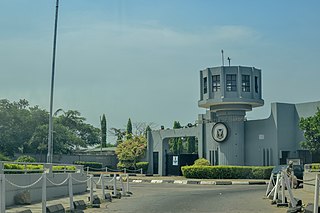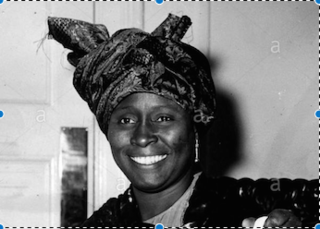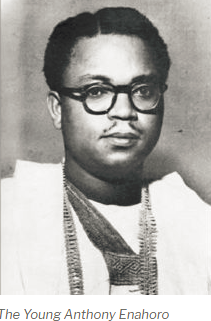Anarchism in Nigeria has its roots in the organization of various stateless societies that inhabited pre-colonial Nigeria, particularly among the Igbo people. After the British colonization of Nigeria, revolutionary syndicalism became a key factor in the anti-colonial resistance, although the trade union movement deradicalized and took a more reformist approach following the country's independence. The contemporary Nigerian anarchist movement finally emerged from the left-wing opposition to the military dictatorship in the late 1980s and saw the creation of the Awareness League.

The University of Ibadan (UI) is a public research university in Ibadan, Nigeria. The university was founded in 1948 as University College Ibadan, one of many colleges within the University of London. It became an independent university in 1962 and is the oldest degree-awarding institution in Nigeria. Through its graduate network, the University of Ibadan has contributed to the political, industrial, economic and cultural development of Nigeria. The history and influence of the University of Ibadan have made it one of the most prestigious universities in Africa.
Grace Alele-Williams OON, FMAN, FNAE was a Nigerian professor of mathematics education, who made history as the first Nigerian woman to receive a doctorate, and the first Nigerian female vice-chancellor at the University of Benin.

Efunroye Tinubu, born Ẹfúnpọ̀róyè Ọ̀ṣuntinúbú, was a powerful Yoruba female aristocrat, merchant, and slave trader in pre-colonial and colonial Nigeria.

Lagos is the largest city of the West-African country of Nigeria, and its former capital; it is the third largest city in Africa in terms of population with about 15.3 million people. It is also the 4th largest economy in Africa.

Tanimowo Ogunlesi (1908–2002) was a Nigerian women's rights activist and the leader of the Women's Improvement League. She was one of the leading women activists of her era and co-founded the National Council of Women's Societies, the country's leading women's rights organization.

Chief Anthony Eromosele Enahoro was one of Nigeria's foremost anti-colonial and pro-democracy activists.
Abimbola Adunni Adelakun is a Nigerian writer.
Chrisland Schools is a conglomerate of schools that has provided education for Nursery, Primary and Secondary School students in Nigeria, with its schools spread across Lagos and Abuja. Pending further investigation on allegations of sexual violence involving students of one of the Chrisland schools, the government has mandated the temporary and potentially permanent shutdown of these schools. The Lagos State Government ordered that all Chrisland Schools be reopened on Monday, April 25, 2022.
Jadesola Olayinka Akande was a Nigerian lawyer, author and academic who is regarded as the first Nigerian female professor of Law.
Bolanle Awe is a Nigerian and Yoruba history professor. She became the Pro-Chancellor of the University of Nigeria in Nsukka. She has been called a Nigerian "intellectual hero".
Festus Bunmi Olusona is a Nigerian human rights activist and politician.
Sophie Bosede Oluwole was a Nigerian professor and philosopher, and was the first doctorate degree holder in philosophy in Nigeria. She was a practitioner of Yoruba philosophy, a way of thinking which stems from the ethnic group based in Nigeria. She was vocal about the role of women in philosophy, and the underrepresentation of African thinkers in education.
Aderonke Kale was a Nigerian army psychiatrist who became the first female major-general in the Nigerian Army. She rose to command the Nigerian Army Medical Corps.
Folasade Tolulope Ogunsola OON(born 1958) is a Nigerian professor of medical microbiology, and the Vice-Chancellor of the University of Lagos. She specializes in disease control, particularly HIV/AIDS. Ogunsola was provost of College of Medicine, University of Lagos and is reputed as being the first woman to occupy the position. She was also the Deputy Vice Chancellor of the institution between 2017 and 2021. She was acting vice chancellor of the University of Lagos for a short period in 2020 when the University was plunged into crisis as a result of the removal of the Vice Chancellor by the University Council.

Ayodele Olofintuade is a Nigerian writer, journalist, and feminist. She identifies as queer and non-binary in Nigeria, which is an anti-LGBTQ country.
Lateefah Durosinmi is a Nigerian chemist and academic. She is a Professor at Obafemi Awolowo University in Ilé-Ifẹ̀, Nigeria.
St Anne's School, Ibadan is a secondary school for girls in Ibadan, Nigeria. The school took its current name in 1950, after a merger between Kudeti Girls School, founded in 1899, and CMS Girls School, Lagos, founded in 1869. It can therefore claim to be the oldest girls secondary school in Nigeria.
In mid-1945, a general strike took place in Nigeria. It was the first of its kind in the nation, growing to comprise an estimated 200,000 workers and seventeen labor unions.
Queenie Ronke Doherty was a Nigerian women's leader who was president of the National Council of Women's Societies from 1976 to 1980. She was among a select few of women appointed into political positions in the 1970s.






